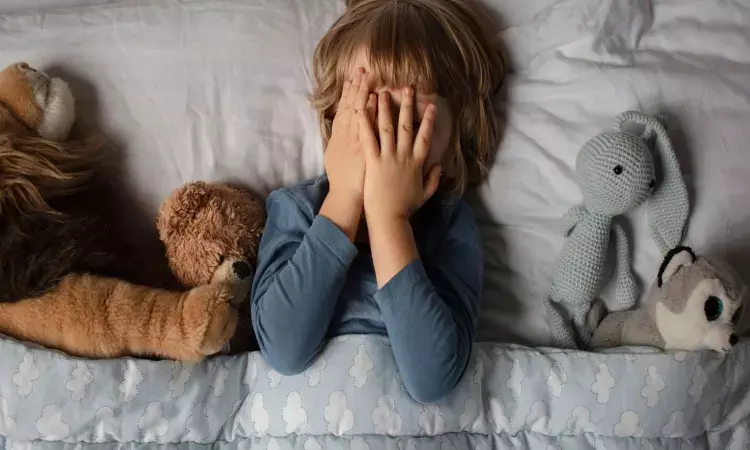- Home
- Medical news & Guidelines
- Anesthesiology
- Cardiology and CTVS
- Critical Care
- Dentistry
- Dermatology
- Diabetes and Endocrinology
- ENT
- Gastroenterology
- Medicine
- Nephrology
- Neurology
- Obstretics-Gynaecology
- Oncology
- Ophthalmology
- Orthopaedics
- Pediatrics-Neonatology
- Psychiatry
- Pulmonology
- Radiology
- Surgery
- Urology
- Laboratory Medicine
- Diet
- Nursing
- Paramedical
- Physiotherapy
- Health news
- Fact Check
- Bone Health Fact Check
- Brain Health Fact Check
- Cancer Related Fact Check
- Child Care Fact Check
- Dental and oral health fact check
- Diabetes and metabolic health fact check
- Diet and Nutrition Fact Check
- Eye and ENT Care Fact Check
- Fitness fact check
- Gut health fact check
- Heart health fact check
- Kidney health fact check
- Medical education fact check
- Men's health fact check
- Respiratory fact check
- Skin and hair care fact check
- Vaccine and Immunization fact check
- Women's health fact check
- AYUSH
- State News
- Andaman and Nicobar Islands
- Andhra Pradesh
- Arunachal Pradesh
- Assam
- Bihar
- Chandigarh
- Chattisgarh
- Dadra and Nagar Haveli
- Daman and Diu
- Delhi
- Goa
- Gujarat
- Haryana
- Himachal Pradesh
- Jammu & Kashmir
- Jharkhand
- Karnataka
- Kerala
- Ladakh
- Lakshadweep
- Madhya Pradesh
- Maharashtra
- Manipur
- Meghalaya
- Mizoram
- Nagaland
- Odisha
- Puducherry
- Punjab
- Rajasthan
- Sikkim
- Tamil Nadu
- Telangana
- Tripura
- Uttar Pradesh
- Uttrakhand
- West Bengal
- Medical Education
- Industry
Sleep disturbances associated with emotional and behavioral difficulties in preschool children

China: A recent study published in JAMA Network Open has shed light on the importance of sleep health in promoting mental well-being in preschool-aged children.
The cohort study of 17 182 preschool-aged children in Shanghai, China, revealed a negative association between the incident and stable sleep disturbances and resolved emotional and behavioural difficulties (EBDs), and a positive association with incident EBDs after adjustment. Resolved sleep disturbances were positively associated with resolved EBDs.
"These findings underscore the association between sleep disturbances and emotional and behavioural difficulties among preschool-aged children and the importance of sleep health in promoting their mental well-being," the researchers wrote in the study.
Mental health problems are the foremost cause of the global disease burden in children and adolescents. In preschool years, psychological disorders may have an early onset with documented changes in brain structure and function involved in emotion processing. Emotional and behavioural difficulties deserve particular attention in preschool-aged children due to their high prevalence and harmful effects on optimal mental health and functioning throughout childhood and later life.
Although EBDs may resolve with the growth of the child, 49.9% of young children still exhibit persistence one year after initial presentation. Furthermore, while early intervention in a clinical setting can improve childhood EBDs, multiple barriers such as stigma, high training demands, availability, and cost of services prevent children from receiving treatment.
Therefore, there is a need to identify both protective and risk factors that are modifiable in large community samples to prioritize more scalable and effective intervention and prevention strategies for EBDs in early childhood. Yujiao Deng, Shanghai Jiao Tong University, Shanghai, China, and colleagues investigated the association between the natural history of sleep disturbances and resolved and incident emotional and behavioural difficulties.
The researchers used data from the SCHEDULE-P, a prospective and population-based longitudinal cohort study of children enrolled in preschools in Shanghai, China. 20 324 children (3-4 years) were recruited from the junior class, of these 17 233 participated in the 2-year follow-up. The association between the development of sleep disturbances and the occurrence of incident and resolved EBDs were evaluated.
Sleep disturbances were evaluated using the Children’s Sleep Habit Questionnaire and EBDs were assessed using the Strengths and Difficulties Questionnaire.
Based on the study, the researchers reported the following findings:
- The cohort included 17 182 participants, with a mean age of 3.73 years at enrollment; 52.0% were boys.
- The prevalence of EBDs at school entry and graduation years was 27.8% and 18.7%, respectively, while the prevalence of sleep disturbances was 41.3% and 31.5%, respectively.
- Among those with EBDs at the entry year, 35.0% maintained stability in the graduation year, while sleep disturbances were stable in 50.0% of those with sleep disturbances.
- After controlling for confounding factors, the odds ratio (OR) for resolved EBDs was lower in the incident sleep disturbance (ISD) group (OR, 0.50) and stable sleep disturbance (SSD) group (OR, 0.47) compared with the group with no sleep disturbances.
- The ORs for incident EBDs among the ISD group (OR, 2.58) and SSD group (OR, 2.29) were higher than among the group with no sleep disturbances.
"Our findings support the consistent integration of questions concerning sleep into routine developmental screenings in contexts of primary care and school," the researchers wrote.
Furthermore, they suggest the need for intervention that targets symptoms of both sleep disturbance and EBDs to determine whether addressing these comorbidities can prevent their progression and effects on a child's well-being.
Reference:
Deng Y, Zhang Z, Gui Y, et al. Sleep Disturbances and Emotional and Behavioral Difficulties Among Preschool-Aged Children. JAMA Netw Open. 2023;6(12):e2347623. doi:10.1001/jamanetworkopen.2023.47623
Dr Kamal Kant Kohli-MBBS, DTCD- a chest specialist with more than 30 years of practice and a flair for writing clinical articles, Dr Kamal Kant Kohli joined Medical Dialogues as a Chief Editor of Medical News. Besides writing articles, as an editor, he proofreads and verifies all the medical content published on Medical Dialogues including those coming from journals, studies,medical conferences,guidelines etc. Email: drkohli@medicaldialogues.in. Contact no. 011-43720751


